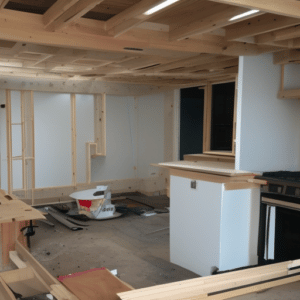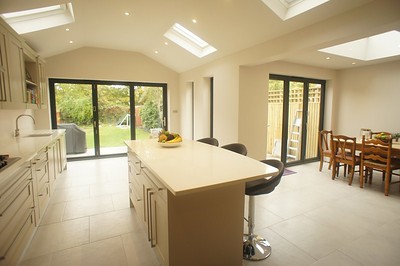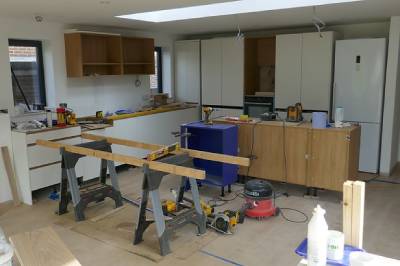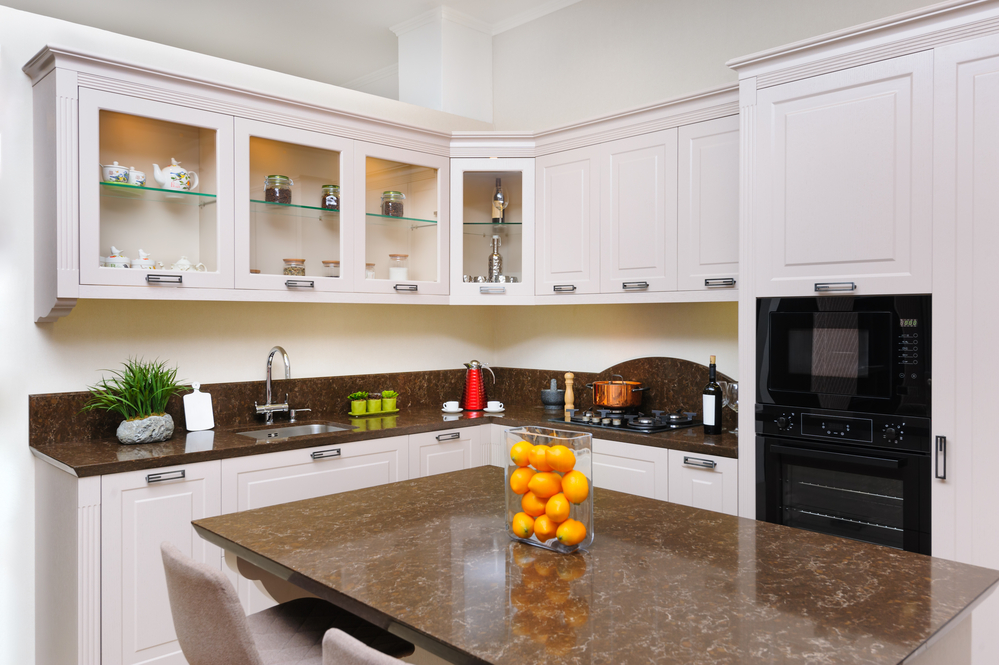Kitchen extensions are one of the most ordinary types of extensions in the UK, aside from a conservatory. If you want something like a rear extension, you must understand what is involved, the various factors to be taken into account, and the expense. This guide looks to answer the question – ‘how much does a kitchen extension cost’ including different considerations, such as planning permission, professional fees, and material costs.
Why Would You Consider a Kitchen Extension?
Oftentimes in UK households, the kitchen is one of the smaller rooms, and the extra space has instead been used in larger living rooms and bedrooms.
As a result, many UK households have a smaller kitchen with virtually no room for a dining table or breakfast bar. This inconvenience means eating in other rooms like the living room.
Therefore, kitchen extensions are incredibly desirable. Firstly, you are adding entirely new space to your house, which means that you can convert your existing kitchen into a kitchen with a dining room.
Secondly, it could also mean that you can simply have more space, storage, and appliances in your kitchen. For example, you could fit more kitchen units into the extension and thus have more storage for your cutlery, pans, and appliances.
A kitchen extension gives you more freedom and space to enjoy your cooking. In most instances, a kitchen extension will also significantly improve the value of your home if you should wish to sell it in the future.
How Much Does a Kitchen Extension Cost — A Detailed Breakdown
It is incredibly difficult to give kitchen extension prices. As you will see below, there are so many factors involved. In order to help, we have split our guide into two main areas of consideration — the construction of the extension and the cost of the kitchen inside the extension.
Part 1 – Construction Costs and Considerations for Building the Extension
The most expensive part of kitchen extensions is the physical structure itself. In most instances, you need to essentially create a new structure attached to your house. This includes a stable floor, walls, and roof. It also includes how the extension connects to your existing house.
Planning Permission and Building Regulations
You must first research if you need planning permission for your kitchen extension. Also, you must check building regulations and see if you need to get permission from your local authority building control.
A kitchen extension is generally considered to be permitted development. This means that kitchen extensions do not need planning permission under the right circumstances. However, your extension must meet the following local building regulations guidelines:

- Not larger than half the area of land around your house
- Not higher than the highest part of your roof
- A single-storey extension must be no higher than four metres
- The materials are similar to the existing external materials of the house
- Double-storey extensions must be at least 7m away from your rear boundary
- The extension should not include any raised platforms, balconies, or verandas
- Any second-floor windows must be obscure-glazed
- Side extensions must only be single-storey
As you can see, there are many considerations, but it is possible to get an extension without the need for planning permission.
It is also important to check if you have a party wall agreement with your neighbours and if the building work will affect a shared wall in any way. If you have a legal agreement, you need to obtain their permission first.
Also, your kitchen extension will need building regulations approval in most instances. The cost for this approval varies depending on your local council. However, you can expect to pay upwards of £500 — depending on the work involved.
For your home improvement project, you will also need proper building plans — these may need to be drawn up by an architect, which is an additional cost. Plus, you may need a structural engineer to assess the walls in your house that have to be knocked through to attach to the extension.
Building Materials
Kitchen extension prices also obviously include the building material. Examples of materials required that you would need to project manage include:
- Bricks
- Breezeblocks
- Render
- Timber frames
- Insulation
- Concrete
- Steel reinforcement
- Patio doors (bi-fold doors or sliding doors)
Therefore, the cost of kitchen extensions in the UK varies greatly depending on the materials your extension uses. For example, it may cost more if you want many floor-to-ceiling glass windows.
Labour Costs
In most instances, you cannot build the kitchen extension yourself. It is far too complicated and requires specialised knowledge. Also, in most instances, there may be several contractors involved.
For example, there may be a contract for the groundwork and a different contract to build the structure and access your existing kitchen.
These labour costs will add up. However, in most instances, you will get a complete quote that includes material costs and labour if you want to use a single contractor to complete the whole project.
Time and Inconvenience
Time and inconvenience are less tangible measures for a small kitchen extension cost.
Creating a kitchen extension is not a quick job. First, the groundwork must be laid. This can take weeks simply to dig out the foundation, install the steel reinforcement, and pour the concrete.
Next, the structure of the kitchen extension has to be built, and your existing external walls have to be altered to accommodate it.
Once this is completed, whatever you want to put inside the extension must be installed, such as a new set of kitchen units or furniture.
So, how long does a kitchen extension take? Well, you must consider all these factors — it could easily take months to complete. All this time, you have the inconvenience, and part of your house may be unusable during construction.
Part 2 – Cost of a Kitchen Itself (Units and Fixtures)
The other major part of kitchen extension costs is the kitchen itself. Your amazing new extension obviously has to be filled with something! You, therefore, need to factor in the cost of the kitchen units, appliances, furniture, flooring, and decorating!
Kitchen Units

If you intend to improve your storage and have more counter space and cupboards, you need to factor in the cost of the kitchen units and worktops.
The cost of these varies wildly depending on the quality, style, and materials you choose. Simple wooden cabinets are usually cheaper, but you can easily pay thousands for a set of quality kitchen units.
The worktops can also be incredibly expensive. Cheaper options for worktops include wood, acrylic, and laminate. The downside with these is that they are not as durable and may scratch or mark easier.
In contrast, more expensive options include solid materials like granite, quartz, and dekton. These look fantastic and are more hard-wearing, but they also cost much more.
New Appliances
Depending on what you want from your conservatory kitchen extension, you may need new appliances. This extra can greatly increase the overall cost and work involved.
For example, you may want a new oven or even a second oven in the extension part. Alternatively, you may want something like a pizza oven. Many people also have additional white goods in their kitchens, like washing machines or dryers.
These are all costs and can add hundreds to your overall expenditure.
Furniture
Depending on the function of your kitchen extension, you may need to purchase furniture too.
For example, if you are using the rear extension as a dining room, you may need to buy a dining table and chairs. In contrast, you may want to create a living area in your extension too. You may therefore need to buy a sofa. There are other small costs, too, such as ornaments.
Decorating
Although kitchen extensions usually have plenty of natural light, some walls usually require decorating too.
Therefore, you must factor in the cost of paint or wallpaper and be a decorator if you don’t want to do the decorating yourself. If you feel confident, you could decorate yourself to save money.
Flooring
The cost of flooring also varies widely but is an important factor. In most instances, there is an underlying concrete flooring that provides structural stability — this is a cost that has to be accounted for first.
On top of this, you then need an actual floor. It could be a simple kitchen lino material, or you could opt for floor tiles. The materials you choose and the type of flooring will greatly alter the overall cost.
You may also want underfloor heating, which can greatly ramp up the overall cost. This feature would need to be installed and planned before the actual kitchen was implemented.
Installation

Lastly, there is also the potential installation cost of a kitchen. Typically you pick out a range of kitchen units from a home store. There is then the option of installing the units yourself or paying for the installation.
You can fit the kitchen units yourself if you have DIY experience. Obviously, you will not complete the installation as quickly as a professional, and it does take hard work and effort.
However, by installing the kitchen yourself, you can save on worker fees.
Kitchen Extension Costs FAQs
Is a Single Storey Kitchen Extension Worth It?
The answer depends on many factors. Are you limited in space in your house, and will it add functional space to your property? Will the extension boost the value of your property? Are you doing it in a cost-effective method? There are simply too many factors to state whether an extension is worth it.
Can You Do a Kitchen Extension Yourself?
No, unless you have structural and construction expertise. A kitchen diner extension usually includes removing part of an external wall and laying the groundwork. These are specialised skills that not everyone is capable of.
Does Your Home Need a Kitchen Extension?
Overall, now you know the answer to the question, ‘how much does a kitchen extension cost’. We hope you have found this guide on planning a kitchen extension useful. As you can see above, many factors can affect the overall cost of such an undertaking. It isn’t easy to give an accurate estimate: the true cost depends mainly on the type and size of the extension and the quality of the kitchen units you want to be installed.

